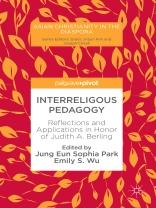This volume is a collection of essays by former students of Judith Berling based on her revolutionary interreligious pedagogy. Her pedagogy can be summarized as a student centered, collaborative, and engaging teaching and learning process sparked by various ways of boundary-crossing. In this enterprise, each chapter explores the importance of understanding and negotiating “differences” through dialogue. The authors provide theoretical frameworks for engagements across conventional borders, and explore how the collaborative teaching model can be utilized in various teaching settings. As an example of her dialogical approach, Judith Berling herself provides a response to the chapters.
Tabella dei contenuti
Chapter 1 Introduction.- Chapter 2 Teaching and Learning Religion with Nones: an Application of Judith Berling’s Pedagogy.- Chapter 3 Crossing Disciplines: Beyond Religious Studies and the Health Sciences.- Chapter 4 Crossing Boundaries with Narratives: Making Space with Oral History in Community Service-Learning.- Chapter 5 Interreligious Education for the Millennial Generation.- Chapter 6 Imprints of Hope from the Global Co-Learning Classroom.- Chapter 7 Critical Engagement: Integrating Spirituality and “Wisdom Sharing” into Higher Education Curriculum Development .- Chapter 8 Frames and Metaphors for Interreligious Dialogue and the Interdisciplainry Study of Religion.- Chapter 9 Concluding Reflections.
Circa l’autore
Jung Eun Sophia Park, SNJM, is associate professor in Religious Studies at the Holy Names University. She is the author of numerous books, including Dislocation as Experience: Creating a Hybrid Identity, Constructing a Borderland (2010), and Border Crossing Spirituality: Transformation in the Borderland (2016). Her research interest is global women’s spirituality and cross-cultural spiritual direction.
Emily S. Wu teaches in the Religion Department and Service-Learning Program in Dominican University of California. She is the author of Traditional Chinese Medicine in the United States: Searching for Spiritual Meaning and Ultimate Health (2013). Wu’s teaching and community work also explore the diasporic, transnational, and cross-cultural Asian experiences.












